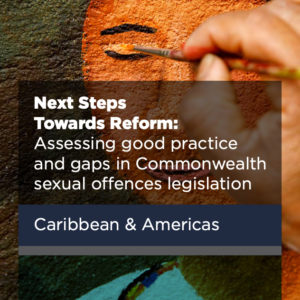Saint Vincent and the Grenadines’ sexual offences laws are in its Criminal Code 1988, [Chapter 171], (as amended) (CC), Criminal Procedure Code 1988, [Chapter 172] (as amended) (CPC) and Evidence Act 1988, [Chapter 220] (as amended) (EA).
Saint Vincent and the Grenadines has undertaken some reform initiatives, such as the Domestic Violence Act 2015 and the Child Justice Bill 2018, but these do not go far enough and further significant reforms are needed to meet good practice, human rights standards.
Specific areas of concern include that the Criminal Code defines rape and sexual assault too narrowly and marital rape is not expressly criminalised. Some child sexual offences are not gender-neutral. The Code criminalises sexual intercourse with a woman who has an intellectual disability regardless of her consent and uses the derogatory terms ‘mental defective’ and ‘subnormality’. The age of consent to sexual activity is 15 years for girls, which is too low. There is no minimum age of consent for boys, which is also not good practice. The age of 15 for girls is lower than most other countries in the Commonwealth. There are no close-in-age defences to avoid criminalising consensual sexual activity where one or both people are under the age of consent and they are peers. Saint Vincent has not abolished the corroboration rule, which is discriminatory and often impacts negatively on sexual assault complainants.
In comments to the CEDAW Committee as part of its periodic review process in 2015, the Government confirmed that Saint Vincent’s criminal law does not expressly criminalise rape within a marriage, but that it applied the common law established in the Privy Council decision in R v R [1992] 1 A.C. 599, which abolished the exception for rape in marriage. The Government stated that future reforms may codify the common law on this point. It also referred to possible future reforms to update the definition of rape to implement recommendations made by the Director of Public Prosecutions. At the time of writing, these reforms had not been completed. Any future reform of Saint Vincent’s sexual offences laws must meet good practice for example, defining rape as gender-neutral and covering all orifices and objects.
Saint Vincent still criminalises consensual same-sex sexual activity. Laws that criminalise consensual same-sex sexual activity, such as ‘buggery’ and ‘sodomy’, should be repealed and all non-consensual sexual acts, including anal ‘rape’, should be included in the standard sexual assaults provisions, such as ‘rape’ and ‘sexual assault’, as well as in child sexual offences. All of these crimes should be gender-neutral.
Saint Vincent is a state party to relevant international and regional human rights treaties, including the Inter-American Convention on the Prevention, Punishment, and Eradication of Violence against Women (Convention of Belém do Pará), UN Convention on the Elimination of All Forms of Discrimination against Women, Convention on the Rights of the Child, Convention on the Rights of Persons with Disabilities, Convention against Torture and Other Cruel, Inhuman or Degrading Treatment or Punishment and the International Covenant on Civil and Political Rights.
Read more about the criminalisation of LGBT people in Saint Vincent and the Grenadines.
The full assessment of Saint Vincent and the Grenadines is available here.



